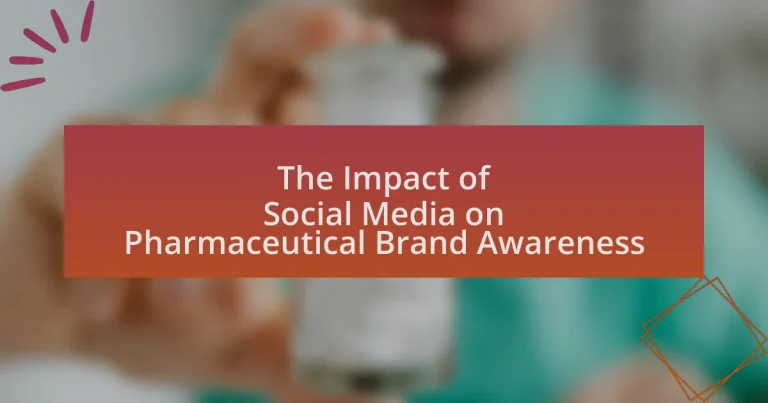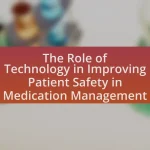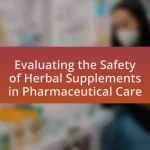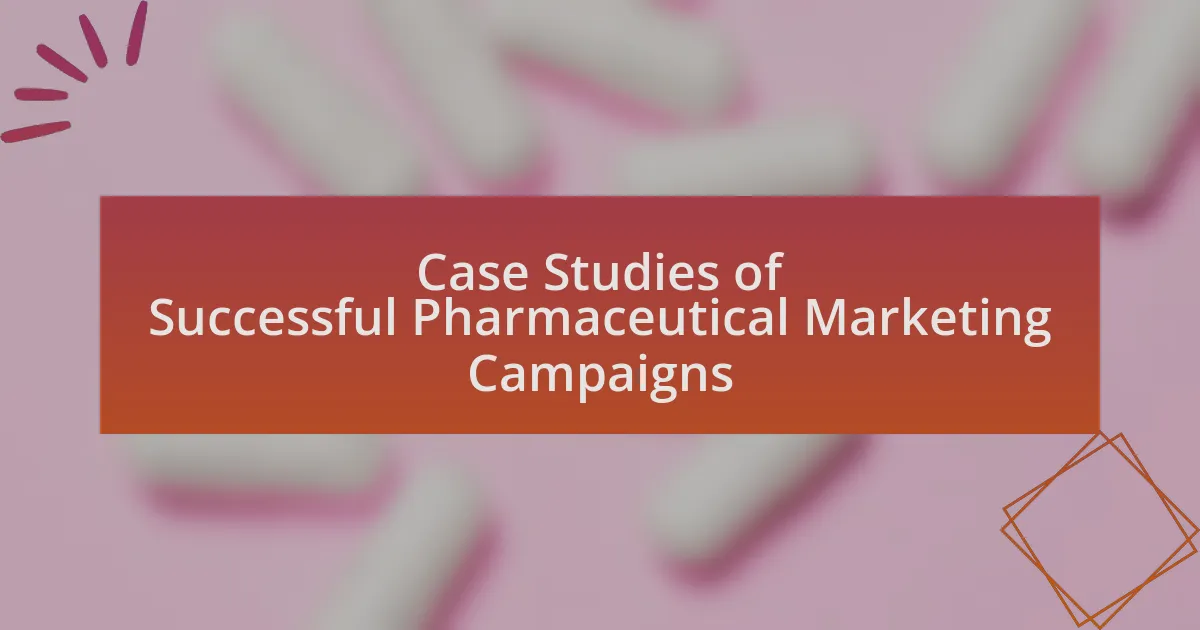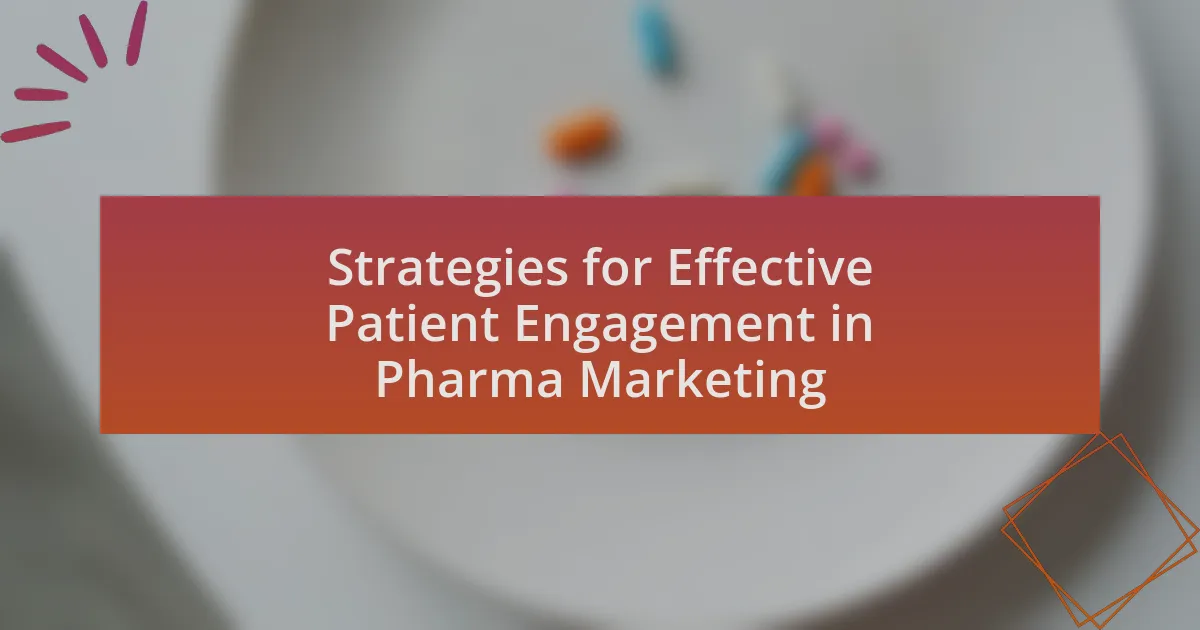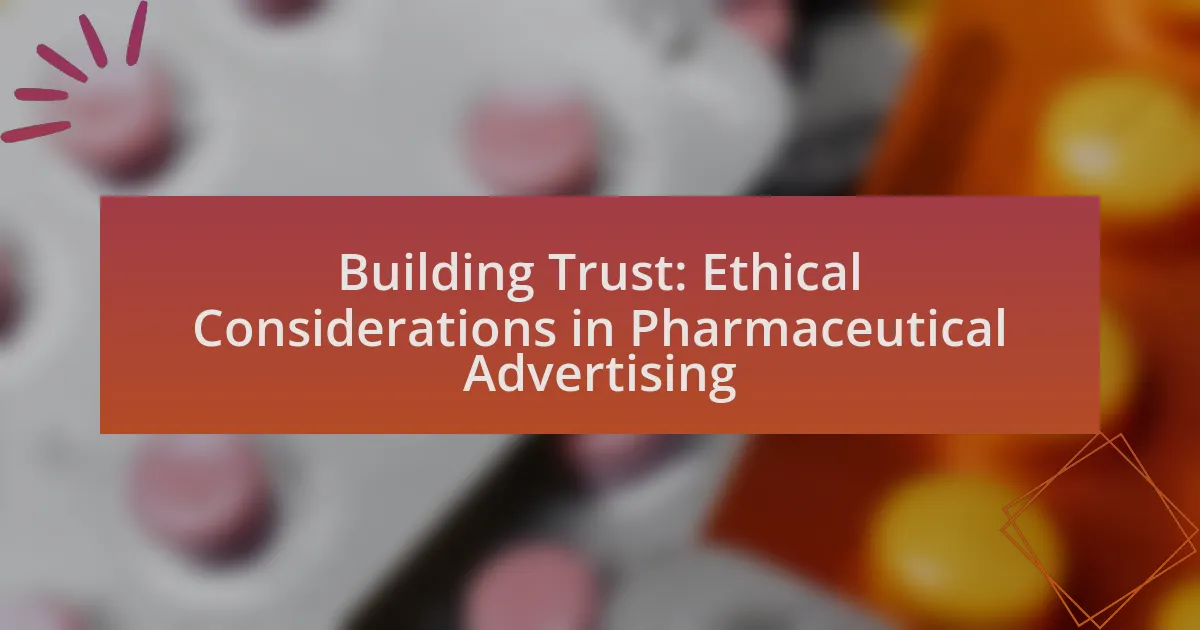The article examines the impact of social media on pharmaceutical brand awareness, highlighting how platforms like Facebook, Twitter, and Instagram enhance visibility and engagement with consumers and healthcare professionals. It discusses the influence of social media on brand perception, emphasizing the importance of user-generated content and real-time interaction in building trust. The article also addresses the challenges pharmaceutical brands face, including regulatory constraints and misinformation, while outlining effective strategies for leveraging social media to improve brand awareness and consumer loyalty. Key benefits of increased brand awareness, such as enhanced trust and market share, are also explored, alongside emerging trends like influencer marketing and the use of visual content.
What is the Impact of Social Media on Pharmaceutical Brand Awareness?
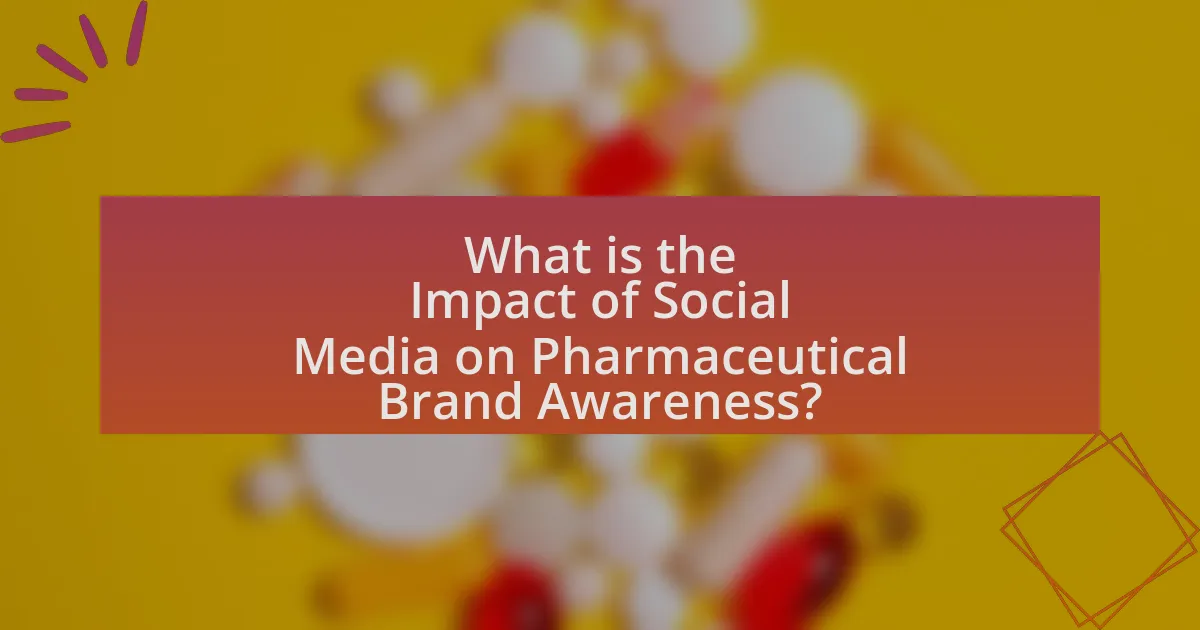
Social media significantly enhances pharmaceutical brand awareness by facilitating direct engagement with consumers and healthcare professionals. Platforms like Facebook, Twitter, and Instagram allow pharmaceutical companies to disseminate information about their products, share educational content, and interact with their audience in real-time. Research indicates that 70% of consumers are more likely to engage with a brand after seeing it on social media, which underscores the effectiveness of these platforms in increasing visibility and recognition. Additionally, a study published in the Journal of Medical Internet Research found that social media campaigns can lead to a 20% increase in brand recall among targeted demographics. This demonstrates that social media not only broadens reach but also strengthens brand identity in the pharmaceutical sector.
How does social media influence brand perception in the pharmaceutical industry?
Social media significantly influences brand perception in the pharmaceutical industry by shaping public opinion and facilitating direct communication between companies and consumers. Through platforms like Twitter, Facebook, and Instagram, pharmaceutical brands can engage with patients, healthcare professionals, and the general public, allowing for real-time feedback and interaction. This engagement can enhance trust and transparency, as consumers increasingly seek information and support online.
Research indicates that 72% of patients use social media to seek health information, which underscores the importance of a strong online presence for pharmaceutical companies. Positive interactions and informative content can lead to improved brand perception, while negative feedback or misinformation can quickly damage a brand’s reputation. Therefore, effective social media strategies are essential for pharmaceutical companies to manage their brand image and foster a positive perception among stakeholders.
What role do user-generated content and reviews play in shaping brand awareness?
User-generated content and reviews significantly enhance brand awareness by providing authentic, relatable experiences that resonate with potential customers. This type of content acts as social proof, influencing consumer perceptions and decisions; for instance, studies show that 79% of consumers trust online reviews as much as personal recommendations. Furthermore, user-generated content fosters community engagement and encourages sharing, which amplifies brand visibility across social media platforms. As a result, brands that effectively leverage user-generated content can achieve higher levels of recognition and trust among their target audience.
How do social media campaigns differ from traditional marketing in pharmaceuticals?
Social media campaigns in pharmaceuticals differ from traditional marketing by leveraging interactive platforms to engage directly with consumers, whereas traditional marketing relies on one-way communication through channels like print and television. Social media allows for real-time feedback, targeted advertising, and community building, which enhances brand awareness and consumer trust. For instance, a study published in the Journal of Medical Internet Research found that social media campaigns can increase patient engagement by 50% compared to traditional methods, demonstrating the effectiveness of digital interaction in the pharmaceutical sector.
Why is brand awareness crucial for pharmaceutical companies?
Brand awareness is crucial for pharmaceutical companies because it directly influences consumer trust and purchasing decisions. High brand awareness leads to increased recognition of a company’s products, which is essential in a highly competitive market where patients and healthcare professionals often rely on familiar brands when making choices about medications. According to a study published in the Journal of Medical Marketing, 70% of healthcare professionals prefer to prescribe medications from brands they recognize, highlighting the importance of brand visibility in influencing prescribing behavior. Additionally, strong brand awareness can enhance patient adherence to treatment regimens, as patients are more likely to follow through with medications from brands they trust.
What are the key benefits of increased brand awareness in the pharmaceutical sector?
Increased brand awareness in the pharmaceutical sector leads to enhanced trust and credibility among healthcare professionals and patients. This trust is crucial as it influences prescribing behaviors and patient adherence to medications. Research indicates that 70% of patients are more likely to choose a brand they recognize, which underscores the importance of visibility in a competitive market. Furthermore, heightened brand awareness can result in improved market share and sales, as recognized brands often experience higher demand. A study by the Journal of Medical Marketing found that companies with strong brand awareness saw a 20% increase in sales compared to those with lower recognition. Thus, the key benefits of increased brand awareness include greater trust, higher patient engagement, and improved financial performance within the pharmaceutical sector.
How does brand awareness affect consumer trust and loyalty in pharmaceuticals?
Brand awareness significantly enhances consumer trust and loyalty in pharmaceuticals. When consumers recognize and are familiar with a pharmaceutical brand, they are more likely to perceive it as credible and reliable. Research indicates that 60% of consumers are more likely to trust brands they are aware of, which directly correlates to their willingness to choose those brands for their healthcare needs. Furthermore, high brand awareness fosters emotional connections, leading to increased loyalty; studies show that 70% of consumers remain loyal to brands they trust, particularly in the pharmaceutical sector where trust is paramount due to the nature of the products involved.
What challenges do pharmaceutical brands face on social media?
Pharmaceutical brands face significant challenges on social media, primarily due to regulatory compliance and public perception. Regulatory bodies, such as the FDA, impose strict guidelines on advertising and communication, which can limit how brands engage with audiences. For instance, brands must ensure that all claims about their products are substantiated and that they provide balanced information about risks and benefits. Additionally, public skepticism regarding pharmaceutical companies can lead to negative sentiment, making it difficult for brands to build trust and credibility. A survey by the Pew Research Center found that only 29% of Americans trust pharmaceutical companies, highlighting the uphill battle brands face in fostering positive engagement on social media platforms.
How do regulatory constraints impact social media marketing strategies?
Regulatory constraints significantly impact social media marketing strategies by limiting the types of content that pharmaceutical companies can share. These constraints often require adherence to strict guidelines regarding the promotion of prescription drugs, including the need for balanced information about risks and benefits, which can restrict creative messaging. For instance, the FDA mandates that any promotional content must include risk information, which can complicate the concise nature of social media posts. Additionally, regulations may restrict the use of testimonials or endorsements, further shaping how brands communicate with their audience. This regulatory environment necessitates that pharmaceutical companies invest in compliance training and legal review processes, ultimately influencing their overall marketing strategy and resource allocation.
What are the risks associated with misinformation on social media platforms?
Misinformation on social media platforms poses significant risks, including the potential to mislead public opinion and influence health-related behaviors. This can lead to harmful consequences, such as vaccine hesitancy, where misinformation about vaccine safety can result in lower vaccination rates, ultimately affecting public health. A study published in the journal “Health Affairs” found that misinformation about COVID-19 vaccines on social media contributed to increased vaccine hesitancy, demonstrating the real-world impact of false information. Additionally, misinformation can damage the reputation of pharmaceutical brands, as consumers may distrust products associated with misleading claims, leading to decreased brand loyalty and sales.
How can pharmaceutical brands effectively utilize social media for brand awareness?
Pharmaceutical brands can effectively utilize social media for brand awareness by creating informative and engaging content that resonates with their target audience. This approach allows brands to educate consumers about their products, share health-related information, and foster community engagement. For instance, a study by the Journal of Medical Internet Research found that 80% of patients use social media for health-related information, highlighting the platform’s potential for outreach. Additionally, leveraging targeted advertising on platforms like Facebook and Instagram can enhance visibility, as these platforms allow for demographic and interest-based targeting, ensuring that the content reaches the most relevant audience.
What strategies can be employed to engage audiences on social media?
To engage audiences on social media, brands should utilize interactive content, such as polls and quizzes, to foster participation. This strategy encourages users to actively engage with the brand, leading to increased visibility and interaction. According to a study by HubSpot, posts that include interactive elements can generate up to 50% more engagement compared to static content. Additionally, leveraging user-generated content allows brands to build community and trust, as consumers are more likely to engage with content that reflects their own experiences. Research from Nielsen indicates that 92% of consumers trust recommendations from individuals over brands, highlighting the effectiveness of this approach.
How can analytics and metrics be used to measure social media impact on brand awareness?
Analytics and metrics can be used to measure social media impact on brand awareness by tracking engagement rates, reach, and impressions across various platforms. Engagement rates, which include likes, shares, and comments, indicate how well content resonates with the audience, while reach measures the total number of unique users who see the content. Impressions provide insight into how often content is displayed, regardless of user interaction.
For instance, a study by the Content Marketing Institute found that brands with higher engagement rates on social media experience a 20% increase in brand recall among consumers. Additionally, tools like Google Analytics and social media insights can quantify these metrics, allowing brands to assess their visibility and recognition in the market effectively.
What are the emerging trends in social media marketing for pharmaceuticals?
Emerging trends in social media marketing for pharmaceuticals include increased regulatory compliance, the use of data analytics for targeted campaigns, and the rise of influencer partnerships. Regulatory compliance has become crucial as pharmaceutical companies navigate strict advertising guidelines, ensuring that their messaging is both informative and compliant with legal standards. Data analytics allows these companies to tailor their marketing strategies based on consumer behavior and preferences, enhancing engagement and effectiveness. Additionally, influencer partnerships are gaining traction, as brands collaborate with healthcare professionals and patient advocates to build trust and authenticity in their messaging. These trends reflect a shift towards more responsible and effective marketing practices in the pharmaceutical industry.
How is influencer marketing reshaping brand awareness in the pharmaceutical industry?
Influencer marketing is reshaping brand awareness in the pharmaceutical industry by leveraging trusted voices to communicate complex health information effectively. This strategy allows pharmaceutical brands to reach targeted audiences through influencers who have established credibility and rapport with their followers. For instance, a study published in the Journal of Medical Internet Research found that health-related content shared by influencers significantly increased engagement and awareness compared to traditional marketing methods. By utilizing influencers, pharmaceutical companies can enhance their visibility, foster trust, and ultimately drive consumer engagement with their products.
What role does visual content play in enhancing pharmaceutical brand awareness on social media?
Visual content significantly enhances pharmaceutical brand awareness on social media by increasing engagement and retention of information. Studies show that posts with images receive 94% more views than those without, making visual elements crucial for capturing audience attention. Furthermore, visual content can simplify complex medical information, making it more accessible and relatable to the general public. This is particularly important in the pharmaceutical industry, where clarity and understanding are vital for patient education and brand trust. By utilizing infographics, videos, and images, pharmaceutical brands can effectively communicate their messages, leading to higher brand recognition and loyalty among consumers.
What best practices should pharmaceutical companies follow for social media engagement?
Pharmaceutical companies should prioritize transparency, compliance with regulations, and audience engagement in their social media strategies. Transparency involves openly sharing information about products, research, and company values, which builds trust with consumers. Compliance with regulations, such as those set by the FDA, ensures that all communications are accurate and do not mislead the public, thereby avoiding legal repercussions. Engaging with the audience through interactive content, responding to inquiries, and addressing concerns fosters a community around the brand. According to a study by the Journal of Medical Internet Research, companies that actively engage with their audience on social media see a 20% increase in brand loyalty and awareness.
How can pharmaceutical brands ensure compliance while engaging on social media?
Pharmaceutical brands can ensure compliance while engaging on social media by adhering to regulatory guidelines set forth by authorities such as the FDA and EMA. These guidelines mandate that all promotional content must be truthful, not misleading, and include necessary risk information. Additionally, brands should implement a robust social media policy that outlines compliance protocols, train employees on these regulations, and monitor social media interactions to ensure adherence. Regular audits of social media content can further help identify and rectify any compliance issues, thereby safeguarding the brand’s reputation and legal standing.
What are the key elements of a successful social media strategy for pharmaceutical brands?
The key elements of a successful social media strategy for pharmaceutical brands include compliance with regulations, targeted audience engagement, content that educates and informs, and the use of analytics to measure effectiveness. Compliance with regulations, such as those set by the FDA, ensures that all communications are legally sound and ethical, which is crucial in the pharmaceutical industry. Targeted audience engagement involves identifying and reaching specific demographics, such as healthcare professionals and patients, to foster meaningful interactions. Content that educates and informs helps build trust and authority, as pharmaceutical brands can share valuable information about their products and health-related topics. Finally, utilizing analytics allows brands to assess the performance of their social media efforts, enabling data-driven adjustments to enhance strategy effectiveness.
